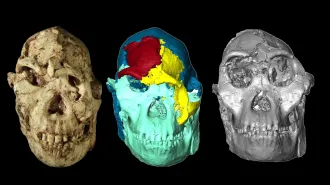In 2001, the winter-flu season developed more gradually than usual in the United States because of a reduction in air travel after the Sept. 11 terrorist attacks, a new study says. The finding indicates that in the future, restricting air travel might delay a domestic outbreak of a dangerous pandemic strain of influenza.
Although curtailing flights could slow a pandemic, it wouldn’t single-handedly reduce the scale of death or illness, says study leader John S. Brownstein of Children’s Hospital Boston. However, flight restrictions might buy a few extra weeks for officials to distribute flu-fighting drugs or a vaccine, he and other scientists say.
Brownstein and his colleagues analyzed the timing of flu-related deaths between 1996 and 2005. While no pandemic occurred during that period, a seasonal flu swept across the United States each winter. Those outbreaks together killed nearly 400,000 people.
The researchers also considered the volume and timing of air travel within the United States and from points abroad. Two statistical relationships emerged, they report in the October PLoS Medicine.
First, the volume of airline passengers entering the United States each September predicted the timing of the next annual peak in flu mortality. Greater travel volume presaged an earlier flu season. Epidemiologists assume that infected travelers introduce the flu into the country each fall, Brownstein says.
Each September of the study’s first 5 years, about 4.5 million airline passengers entered the United States, and peak flu mortality occurred, on average, on Feb. 17.
By contrast in September 2001, only 3.5 million passengers entered the United States. In the 2001-2002 flu season, peak mortality occurred on March 2.
Air travel gradually rebounded in subsequent years, and peak flu mortality eventually returned to Feb. 17.
The second statistical relationship linked domestic air travel during November, with its busy Thanksgiving holiday, with the speed with which flu spreads across the country.
Summarizing the findings, Brownstein says that after Sept. 11, 2001, “flu eventually got everywhere across the country, [but] it was delayed in getting to some places.” By comparison, there was no delay in the spread of flu that winter in France, which didn’t experience a reduction in air traffic.
The new study provides valuable empirical support for recent results from computer simulations, says epidemiologist Ira Longini of the Fred Hutchinson Cancer Research Center in Seattle. Earlier this year, he and other researchers concluded from simulation results that air-travel restrictions alone could delay a pandemic by a few weeks (SN: 4/8/06, p. 213: Available to subscribers at A Shot against Pandemic Flu: Vaccines would play pivotal role in response).
But Longini agrees with Brownstein that even “drastic disruption of air travel” is unlikely to save lives unless extra doses of antiflu drugs and a vaccine become available.
Rebecca Freeman Grais, a Paris-based epidemiologist who has modeled flu outbreaks, adds that any benefit from restricting air travel would need to be weighed against substantial economic and social costs.







